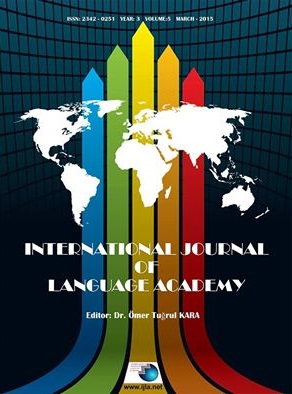Author :
Abstract
İngilizce tüm dünya genelinde konuşulan ortak dil durumundadır. İngilizcenin önemli bir yeri olan evrensel eğitim çağında öğrenci değişim programları evrensel eğitimi devam ettirmede hızlı bir şekilde kilit unsur olmaktadır. Bundan dolayı, üniversiteler Erasmus değişim öğrencilerinin yurtdışında eğitim görmelerini sağlamak ve yurt dışında kaldıkları sürede günlük hayatlarını kolaylaştırmak için İngilizce dil programları hazırlamaktadırlar. Program değerlendirme sadece tüm ilgili kişilerin ihtiyaçları ve beklentileri doğrultusunda bir dil programının yeterli şekilde planlanması ve uygulanmasında değil aynı zamanda bu programın sürekli gelişimi için de önemli bir konu durumuna gelmiştir. Bu çalışma Türk Erasmus değişim öğrencileri için hazırlanan ve bir ay süren bir İngilizce dil kursunu değerlendirmeyi amaçlamıştır. Bu kurs temel olarak her bir ünitesinde günlük yaşamla ilgili bir duruma ağırlık veren A1 seviyesindeki bir beceri kitabı yardımıyla öğrencilerin dinleme ve konuşma becerilerini geliştirmek için tasarlanmıştır. Sürece dayalı yaklaşım temel alınmıştır ve sürecin her aşaması anketler ve görüşmeler yoluyla programdaki katılımcıların katkısıyla değerlendirilmiştir. Veriler anketler ve yarı-yapılandırılmış görüşmeler yoluyla elde edilmiştir. Nitel ve nicel sonuçlar Erasmus değişim öğrencilerinin yurtdışında eğitim gördükleri süre boyunca bir takım dil sorunları yaşadıklarına dair önemli sonuçlar ortaya çıkarmıştır. Bu yüzden, bu öğrenciler içintasarlanan İngilizce dil kurslarının günlük hayatlarında kolaylıkla iletişim kurmalarını ve yurtdışında öğrenim görebilmelerini sağlamaları için yardımcı olmaları gerektirmektedir.
Keywords
Abstract
English has turned out to be a lingua franca all over the world. In the era of global education where English has a leading role, students exchange programs are fast becoming a key instrument in the maintenance of global education. Therefore, universities develop language programs for their Erasmus exchange students to provide them opportunities to improve their English so as to survive and study abroad. Program evaluation has become a central issue not only for adequate planning and implementation of a language program regarding the needs and the expectations of all stakeholders but also for the on-going improvement of it. This study aimed to evaluate an English language course for Turkish Erasmus exchange students which lasted one month. The course was basically designed to enhance the listening and the speaking skills of the students with the help of an A1 level skill-based coursebook which focuses on daily life situations in each unit. Process-oriented approach was taken as a basis and each stage of the process was evaluated with the contribution of all stakeholders in the program by means of questionnaires and interviews. Data were collected through questionnaires and semi-structured interviews. The qualitative and quantitative results revealed significant results in that Turkish Erasmus exchange students experienced a number of language problems while they were studying abroad. Thus, language courses designed for these students need to attempt to help them to communicate easily in their daily lives and to be able to study abroad.
Keywords
- Abiri, F. (2013). Exploration of English needs according to teachers and learners in the psychology major Iranian universities. Procedia, Social and Behavioral Sciences, 70(2013), 821-826. doi: 10.1016/j.sbspro.2013.01.127.
- Arkın, F. (2010). Program evaluation: Skill-based language teaching in EFL. Procedia Social and Behavioral Sciences, 2(2010), 3339–3350. doi:10.1016/j.sbspro.2010.03.513
- Brown, J. R. (1995). The elements of language curriculum. Boston, the USA: Heinle & Heinle Publishers.
- Dehnad, A., Bagherzadeh, R., Shoaleh B., Hatami, K., & Hosseini, F. (2010). Syllabus revision: A needs analysis study. Procedia Social and Behavioral Sciences, 9 (2010) 1307–1312. doi:10.1016/j.sbspro.2010.12.325.
- Dökü, M. K. (2013). The problems of Erasmus students studying at Akdeniz University. Procedia - Social and Behavioral Sciences, 70( 2013 ), 567 – 573. doi: 10.1016/j.sbspro.2013.01.094.
- Ekici, N. (2003). A needs assessment study on English language needs of the tour guidance students of faculty of applied sciences at Başkent University (Unpublished master’s thesis). Middle East Technical University, Ankara, Turkey.
- Erozan, F. (2005). Evaluating the language improvement courses in the undergraduate ELT curriculum at Eastern Mediterranean University: A case study (Unpublished doctorate thesis). Middle East Technical University, Ankara, Turkey.
- Kaypak, E., & Ortaçtepe, D. (2014). Language learner beliefs and study abroad: A study on English as a lingua franca. System, 42(2014), 355-367.
- Klimova, B. F. (2014). Czech Erasmus students and their EAP needs. Procedia - Social and Behavioral Sciences, 112 (2014), 152 – 157. doi: 10.1016/j.sbspro.2014.01.1150.
- Kocaman, O., & Balcıoğlu, L. (2013). Students perceptions on the development of speaking skills: A course evaluation in the preparatory class. Procedia - Social and Behavioral Sciences, 106 (2013), 2470 – 2483. doi: 10.1016/ j.sbspro.2013.12.284.
- Liu, J., Chang, Y., Yang, F., & Sun, Y. (2011). Is what I need what I want? Reconceptualising college students’ needs in English for general and specific/academic purposes. Journal for Academic Purposes, 10(2011), 271-280. doi:10.1016/j.jeap.2011.09.002
- Mehrdad, A. G. (2012). A subjective needs assessment of EGP students. Procedia - Social and Behavioral Sciences,31(2012), 546-554. doi:10.1016/j.sbspro.2011.12.101.
- Rea-Dickins, P., & Germaine, K. (1992). Evaluation. Oxford, the UK: Oxford University Press.
- Richards, J. K. (2001). Curriculum development in language teaching. Cambridge, the UK: Cambridge University Press.
- Tsou, W., & Chen, F. (2014). ESP program evaluation framework: Description and evaluation to a Taiwanese university ESP program. English for Specific Purposes, 33 (2014), 39-53.
- (adapted from Klimova, 2004)
